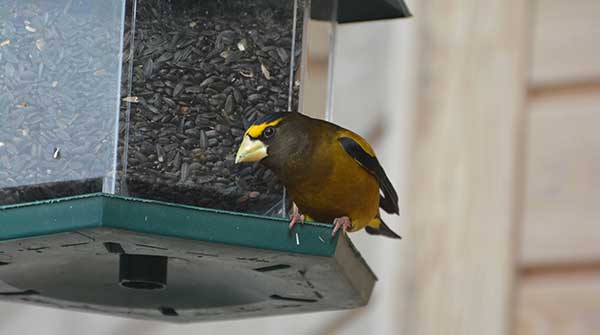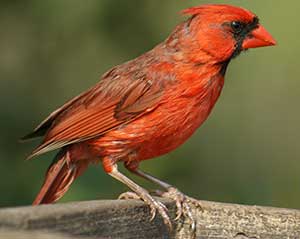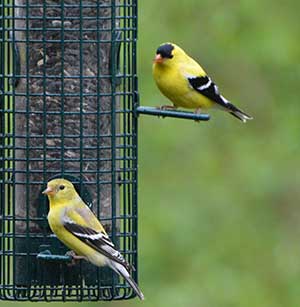Don’t forget to take precautions when setting up your bird feeders to keep your feathered friends safe
 As the winter season approaches, bird enthusiasts across the country are gearing up to welcome a flurry of feathered friends to their backyards. Setting up bird feeders is a wonderful way to attract and observe these avian visitors, but it’s essential to do so with the well-being of the birds in mind.
As the winter season approaches, bird enthusiasts across the country are gearing up to welcome a flurry of feathered friends to their backyards. Setting up bird feeders is a wonderful way to attract and observe these avian visitors, but it’s essential to do so with the well-being of the birds in mind.
So all this means that if you haven’t already, you should get your feeders out and filled. But before you do, here are a few tips that will keep your birds safe:
1. Cleanliness is Key: Before hanging your bird feeders, ensure they are thoroughly cleaned with a mixture of light bleach and water. Rinse them until there is no residual chlorine odor, and allow them to dry completely. Clean feeders help prevent the spread of diseases among the birds that visit your yard.
| Related Stories |
| How do birds stay warm in winter?
|
| Why do birds really migrate in the fall?
|
| Why birds practise their mating songs in winter
|
 Evening Grosbeak |
 Northern Cardinal |
 American Goldfinch |
2. Choose the Right Feeder: Different bird species have different feeding preferences. Consider using various types of feeders to accommodate a wide variety of birds. Tube feeders, platform feeders, and suet feeders are some popular choices. Make sure to select feeders that are appropriate for the species you wish to attract.
3. Seed Selection: Birdseed is the primary attraction for many species. While there are various seed mixes available, opt for blends with less millet and more sunflower seeds. Smaller black sunflower seeds are preferred by many birds, and mixing in some other seeds can create an appealing buffet for your feathered visitors.
4. Ground Feeding: Scatter rolled corn on the ground to attract sparrows, doves, cardinals, and other ground-feeding birds. This is an economical way to provide food and entertainment for these species.
5. Moistened Niger Seeds: If you want to attract finches, especially goldfinches, consider using Niger seeds in tubular feeders. Soak the seeds in small batches for about 30 minutes, air dry them, and then fill your feeder. This extra step makes the seeds more palatable to the birds.
6. Suet Blocks for Woodpeckers: Don’t forget our woodpecker friends! Hang suet blocks to cater to their palate. Suet is an excellent source of energy for these birds, especially during the colder months.
7. Feeder Placement: Position your feeders strategically. Choose a spot that provides a clear line of sight so you can enjoy watching the birds. However, avoid placing them under dense cover, as it can make the birds vulnerable to predators.
8. Protect Against Window Collisions: To prevent birds from flying into your windows and potentially getting injured, hang light curtains, blinds, or window decals. These measures help reduce the chances of collisions, making your yard safer for your avian guests.
9. Keep Cats Indoors: If you have a pet cat, it’s crucial to keep it indoors. Cats are natural predators, and outdoor cats pose a significant threat to birds and other wildlife. Keeping them inside helps protect the local bird population.
10. Be Patient and Enjoy: Once you’ve set up your feeders, be patient and enjoy the show! Birdwatching can be a relaxing and educational experience for the whole family. Grab a pair of binoculars and a field guide to identify the different species that visit your yard.
By following these tips, you can create a bird-friendly oasis in your backyard while ensuring the safety and well-being of your avian visitors. So, get your bird feeders ready, and prepare to be amazed by the diverse and beautiful birds that will soon grace your outdoor space.
Happy birdwatching!
Geoff Carpentier is a published author, expedition guide and environmental consultant.
For interview requests, click here.
The opinions expressed by our columnists and contributors are theirs alone and do not inherently or expressly reflect the views of our publication.
© Troy Media
Troy Media is an editorial content provider to media outlets and its own hosted community news outlets across Canada.

